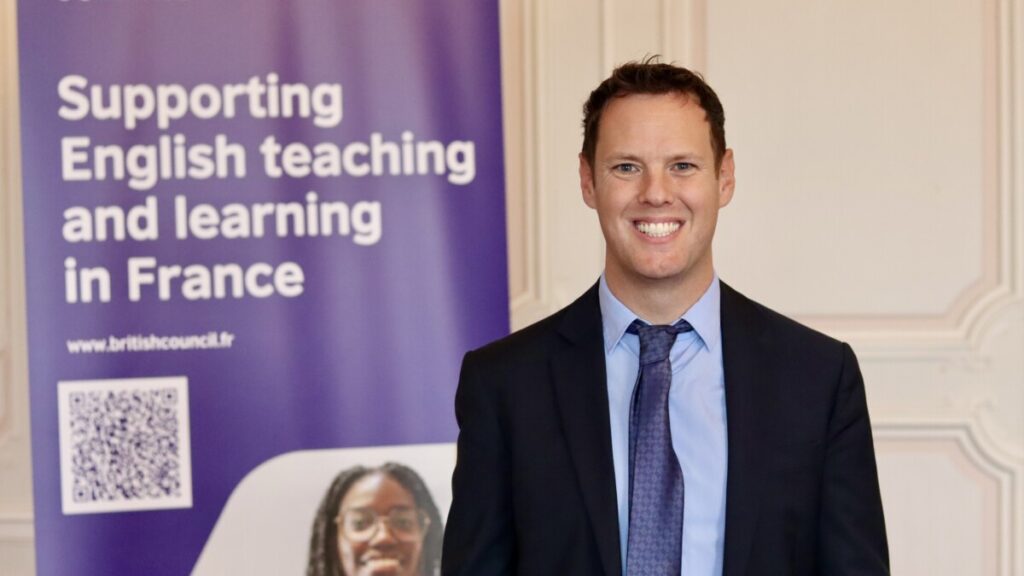As companies seek to improve the language skills of their employees, artificial intelligence (AI) is gradually making its way into training systems. We spoke to George Wilson, Director of English Programmes and School Education at the British Council, to find out what AI can really do for language learning.

[Interview]
ORSYS Editorial Board: Since when and why has the British Council been interested in AI?
George Wilson: The British Council has been in existence for over 90 years, with English language teaching as its core mission. To maintain our leadership position, it is essential to anticipate future developments. The organisation has a long-standing interest in educational technology, and AI is just the latest iteration - another step in a journey of innovation... It is essential not only to understand but also to shape AI tools so that they become effective and not negative disruptors of language learning. In 2024, we published a report on the use of AI in English language teaching, updated in July of the same year to reflect the most recent advances. We want to talk about AI in an informed and useful way, to make it a lever for quality in our practice.
Can AI effectively personalise language learning?
The promise of personalisation offered by AI raises many expectations. The word "personalise" contains the word "person". And this personalisation is nothing new: teachers have been doing it for ages. What has changed is that AI makes it possible to automate and refine it on a large scale. But AI remains a tool. It does not replace the teacher or human interaction. It can contribute to the effectiveness of training, as the Internet did in its day.
Acculturation to AI therefore requires teacher training. They will need to be supported so that they can appropriate AI tools as effectively as possible.
This transformation requires support. We are all concerned by the acculturation to AI. It's not just a question of mastering the tools, but of thinking about how we use them in our professional practices, in a spirit of responsibility. The British Council has published best practice guides to support teachers and schools in this transition. In France, this dynamic is supported by a recent charter from the French Ministry of Education (June 2025).
What types of AI tools are the most promising for learning English? How can we ensure that these tools remain human-centred and encourage real progress?
Generative AI and large language models (LLMs) are taking centre stage today. They have the potential to revolutionise and influence the way we learn languages, but also to challenge our relationship with foreign language communication, given their impressive translation performance. Automatic translation tools should always be used with discretion. They facilitate exchanges, but they are no substitute for personal expression or cultural understanding. Language is part of our identity.
Do you think language skills will become less important in the age of automatic translators?
It's all very well using a translator to speed things up, but a sincere conversation, a relationship of trust or friendship can't be forged via an AI. Speaking a language also means asserting yourself, making choices that define you. AI can amplify our expression, but it must not replace our voice. It's essential to retain control over the message we transmit.
Let's talk about best practice and the way forward. What advice would you give to a company wishing to improve its employees' level of English?
When a company wants to improve its employees' level of English, it must first bear in mind that each learner is unique. All too often, training courses are standardised, based on rigid language levels, whereas each individual has his or her own linguistic and professional needs. It is therefore crucial to call on experts who can assess these specific needs and design truly personalised courses. A CEO does not use the English language in the same way as a security guard: the uses are different, and so are the objectives.
We also need to get away from the myth of linguistic perfection. What matters is the ability to express oneself clearly and effectively. Many people are held back from speaking by their accent, even though it is an asset and a marker of their identity that needs to be preserved. We need to cultivate confidence, rather than an obsession with flawlessness.
Finally, it is essential to remember that teaching English is not something you can improvise. Speaking English is not enough to be a teacher. It's a profession that relies on solid knowledge of pedagogy, linguistics and built-up experience. Choosing the right professionals means guaranteeing quality training.
So not all your English teachers are native speakers?
The best teachers are not necessarily native speakers. What counts is mastery of the language and the ability to teach it. We need to move beyond the idea that origin determines legitimacy. Diversity of background and experience enriches learning.
How do you see language training developing over the next five years?
We are currently carrying out several research projects as part of our study, The Future of English. This study explores eight major themes, including: to what extent will professional needs redefine learning methods? The answers are not yet clear, but one thing is certain: the future of language training must be based on solid principles.
We need to move away from a vision that focuses exclusively on native speakers. English belongs to everyone who uses it, and today more people speak it as a second language than as their mother tongue. This is the reality that needs to be reinforced: confidence, appropriation, everyday use - whether professional, emotional or academic.
Technology will play a central role in this transformation. It is already opening up new prospects, by providing access to more flexible and inclusive hybrid or distance learning formats. As we have seen since the pandemic, online teaching has revolutionised practices, without eliminating the need for face-to-face teaching. This new balance means that teaching tools can be better adapted to each situation. It also paves the way for a more inclusive approach, where mother tongues and multilingualism have their rightful place in the training room, far from the idea that only the target language should be used.
Find out more about the British Council's work to support the teaching, learning and assessment of English in France: https://www.britishcouncil.fr/en/programmes/english-programmes/education





